| Srl | Item |
| 1 |
ID:
139725
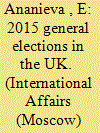

|
|
|
|
|
| Summary/Abstract |
Labour, Lib-Dems and UKIP suffered a crushing defeat, along with the analysts (me included) who had never expected that the Tories would win by a vast majority to knock together a one-party cabinet. For at least a month and a half before the elections, all public opinion polls indicated that the two leading parties were running neck and neck, so to speak with about 33-34 percent of the voters prepared to support either Labour or Tories. The aggregate rating of the smaller parties (slightly less than 70 percent) indicated that they stood a good chance to get a place in the sun.
|
|
|
|
|
|
|
|
|
|
|
|
|
|
|
|
| 2 |
ID:
107203
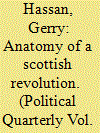

|
|
|
|
|
| Publication |
2011.
|
| Summary/Abstract |
Scottish politics isn't about some remote northern politics but go to the heart of the nature, character and power dimensions of the UK and British state. Scotland has been dramatically changed by the scale of the SNP landslide victory in the 2011 Scottish Parliament elections. Scottish society, identity and culture along with the politics of unionism and nationalism have all changed and will change further. The old fashioned politics of devolution are dead, but what comes next and what are the consequences for Scottish independence? What has to be challenged are old-fashioned out-of-date views of the SNP, and the unreconstructed nationalism of the British state.
|
|
|
|
|
|
|
|
|
|
|
|
|
|
|
|
| 3 |
ID:
138905
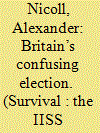

|
|
|
|
|
| Summary/Abstract |
Were it to be a straightforward ‘economy, stupid’ contest, the Conservative Party, led by Prime Minister David Cameron, might be expected to triumph in Britain’s 7 May 2015 general election. The government that took office in 2010, a coalition between the Conservatives and the third-placed Liberal Democrats, inherited a large budget deficit and a steep recession that had
begun with the 2008 financial crisis.
|
|
|
|
|
|
|
|
|
|
|
|
|
|
|
|
| 4 |
ID:
172396
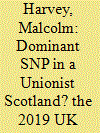

|
|
|
|
|
| Summary/Abstract |
The UK general election in December 2019 produced a resounding victory for Boris Johnson’s Conservatives, returning a majority government and the mandate for Brexit that he had campaigned for. The picture was less rosy for the Conservatives in Scotland, where his party lost half its seats to the SNP. This article reviews the election outcome in Scotland, considering the fortunes of each of the main parties, and projects forward to the devolved election in 2021, when the parties will once again debate the key constitutional question in Scotland.
|
|
|
|
|
|
|
|
|
|
|
|
|
|
|
|
| 5 |
ID:
111658
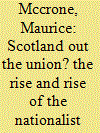

|
|
|
|
|
| Publication |
2012.
|
| Summary/Abstract |
The election of the Scottish National party as a majority government in 2011 is as challenging to the British state as it was unexpected. While explanations for SNP success focused on Labour's faulty campaign and poor leadership, the last half-century has seen the rise and rise of the nationalist agenda in Scotland. Scotland's politics are now more different from England's than at any time since the 1950s. The Scottish parliament is the effect of that change rather than its cause, while party competition between Labour and the SNP north of the border has shifted political gravity centre-left in contrast with England. It is not inevitable, however, that Scots would vote for Independence in a referendum. Nevertheless, Scotland is a more semi-detached country than at any point in the history of the Union, and the future of the British state, at least in its present form, cannot be taken for granted.
|
|
|
|
|
|
|
|
|
|
|
|
|
|
|
|
| 6 |
ID:
152555


|
|
|
|
|
| Summary/Abstract |
Since the 1980s the Scottish National Party has presented its political project in progressive terms, but this created a twin dilemma: in order to achieve independence, the SNP needed to win political power, and in order to achieve political power it had to win an election, and orthodoxy dictated that winning elections in Scotland involved a centre-left platform. But the two have often been in conflict, as is clear as the SNP approaches its tenth anniversary in devolved government and agitates for another referendum.
|
|
|
|
|
|
|
|
|
|
|
|
|
|
|
|